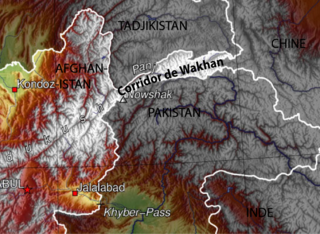
A dōjō is a hall or place for immersive learning, experiential learning, or meditation. This is traditionally in the field of martial arts. The term literally means "place of the Way" in Japanese.

A mountain pass is a navigable route through a mountain range or over a ridge. Since mountain ranges can present formidable barriers to travel, passes have played a key role in trade, war, and both human and animal migration throughout history. At lower elevations it may be called a hill pass. A mountain pass is typically formed between two volcanic peaks or created by erosion from water or wind.

The Wakhan Corridor is a narrow strip of territory in the Badakhshan province of Afghanistan. This corridor stretches eastward, connecting Afghanistan to Xinjiang, China. It also separates the Gorno-Badakhshan Autonomous Region of Tajikistan in the north from the Khyber Pakhtunkhwa and Gilgit-Baltistan regions in Pakistan in the south, the latter of which is also part of the disputed region of Kashmir. This high mountain valley, which rises to a maximum altitude of 4,923 m (16,152 ft), serves as the source of both the Panj and Pamir rivers, which converge to form the larger Amu Darya River. For countless centuries, a vital trade route has traversed this valley, facilitating the movement of travelers to and from East, South, and Central Asia.

Allan Robert Border is an Australian cricket commentator and former international cricketer. A batsman, Border was for many years the captain of the Australian team, and led his team to victory in the 1987 Cricket World Cup, the maiden world title for Australia. His playing nickname was "A.B.". He played 156 Test matches in his career, a record until it was passed by fellow Australian Steve Waugh. Border formerly held the world record for the number of consecutive Test appearances of 153, before it was surpassed in June 2018 by Alastair Cook, and is second on the list of number of Tests as captain.

In the United States, time is divided into nine standard time zones covering the states, territories and other US possessions, with most of the country observing daylight saving time (DST) for approximately the spring, summer, and fall months. The time zone boundaries and DST observance are regulated by the Department of Transportation, but no single map of those existed until the agency announced intentions to make one in September 2022. Official and highly precise timekeeping services (clocks) are provided by two federal agencies: the National Institute of Standards and Technology (NIST) ; and the United States Naval Observatory (USNO). The clocks run by these services are kept synchronized with each other as well as with those of other international timekeeping organizations.

Nathu La(Tibetan: རྣ་ཐོས་ལ་, Wylie: Rna thos la, THL: Na tö la, Sikkimese: རྣ་ཐོས་ལ་) is a mountain pass in the Dongkya Range of the Himalayas between China's Yadong County in Tibet, and the Indian states of Sikkim. But minor touch of Bengal in South Asia. The pass, at 4,310 m (14,140 ft), connects the towns of Kalimpong and Gangtok to the villages and towns of the lower Chumbi Valley.

Qi was a Chinese king, the son of Yu the Great and the second sovereign of the Xia dynasty. He ruled for roughly nine to ten years.

Wang Chang, courtesy name Wenshu (文舒), was a Chinese military general and politician of the state of Cao Wei during the Three Kingdoms period of China.

The Great Wall of China is a series of fortifications in China. They were built across the historical northern borders of ancient Chinese states and Imperial China as protection against various nomadic groups from the Eurasian Steppe. The first walls date to the 7th century BC; these were joined together in the Qin dynasty. Successive dynasties expanded the wall system; the best-known sections were built by the Ming dynasty (1368–1644).

Dojang (Korean: 도장) is a term used in Korean martial arts, such as Taekwondo, Tang Soo Do, Kuk Sool Won, and hapkido, that refers to a formal training hall. It is typically considered the formal gathering place for students of a martial art to conduct training, examinations and other related encounters.

The Nathu La and Cho La clashes, sometimes referred to as Indo-China War of 1967, Sino-Indian War of 1967, were a series of border clashes between China and India alongside the border of the Himalayan Kingdom of Sikkim, then an Indian protectorate.

Eagle Pass is a city in and the county seat of Maverick County, Texas, United States. Its population was 28,130 as of the 2020 census. Eagle Pass borders the city of Piedras Negras, Coahuila, Mexico, which is to the southwest and across the Rio Grande river.

The Khyber Pass is a mountain pass in the Khyber Pakhtunkhwa province of Pakistan, on the border with the Nangarhar Province of Afghanistan. It connects the town of Landi Kotal to the Valley of Peshawar at Jamrud by traversing part of the White Mountains. Since it was part of the ancient Silk Road, it has been a vital trade route between Central Asia and the Indian subcontinent and a strategic military choke point for various states that controlled it. The Khyber Pass is considered one of the most famous mountain passes in the world.

The Wakhjir Pass, also spelled Vakhjir Pass, is a mountain pass in the Hindu Kush or Pamirs at the eastern end of the Wakhan Corridor, the only potentially navigable pass between Afghanistan and China in the modern era. It links Wakhan in Afghanistan with the Tashkurgan Tajik Autonomous County in Xinjiang, China, at an altitude of 4,923 metres (16,152 ft). The pass is not an official border crossing point. With a difference of 3.5 hours, the Afghanistan–China border has the sharpest official change of clocks of any international frontier. China refers to the pass as South Wakhjir Pass, as there is a northern pass on the Chinese side.

The Houmuwu ding, also called Simuwu ding, is a rectangular bronze ding of the ancient Chinese Shang dynasty. It is the heaviest piece of bronzeware to survive from anywhere in the ancient world. It was unearthed in 1939 in Wuguan Village, Anyang, Henan, near Yinxu, the site of the last Shang dynasty capital.

National Highway 1 in India runs between the union territories of Jammu & Kashmir and Ladakh. It comprises parts of old NH1A and NH1D. The number 1 indicates, under the new numbering system, that it is the northernmost East-West highway in India.

National Highway 3, or NH 3, is a national highway in India. It starts from Atari adjacent to India-Pakistan border and near Amritsar and terminates at Leh in Ladakh, via Manali in Himachal Pradesh.
Tongjiao Temple is a Buddhist temple located in Dongcheng District of Beijing. It covers an area of 700-square-metre (7,500 sq ft). Now it is the only Bhikkhuni temple in Beijing. It was inscribed to the National Key Buddhist Temples in Han Chinese Area's list in 1983.
Guan, literally translated as hat or cap or crown in English, is a general term which refers to a type of headwear in Hanfu which covers a small area of the upper part of the head instead of the entire head. The guan was typically a formal form of headwear which was worn together with its corresponding court dress attire. There were sumptuary laws which regulated the wearing of guan; however, these laws were not fixed; and thus, they would differ from dynasty to dynasty. There were various forms and types of guan.

Lingzi, also called zhiling, refers to a traditional Chinese ornament which uses long pheasant tail feather appendages to decorate some headdress in Xifu, Chinese opera costumes. In Chinese opera, the lingzi not only decorative purpose but are also used express thoughts, feelings, and the drama plot. They are typically used on the helmets of warriors, where a pair of pheasant feathers extensions are the indicators that the character is a warrior figure; the length of the feathers, on the other hand, is an indicator of the warrior's rank. The lingzi are generally about five or six feet long. Most of the time, lingzi are used to represent handsome military commanders.



















